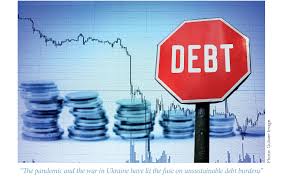ISLAMABAD Oct 19 (INP-WealthPK): All Pakistan Business Forum (APBF) President Syed Maaz Mahmood has said the present rigid monetary policy stance of the central bank has failed to contain the hyperinflation in the country.
In a statement received by WealthPK, he warned the authorities that rising inflation can hurt economic growth in Pakistan and that a careful policy is required to keep it in control. He observed that the industry has suffered from the double-edged sword of food and energy prices with transport inflation peaking to a record 65% while the annual inflation rate increased to 27% in the fiscal year 2021-22.
Mahmood said that the high interest rates in a low growth environment will create bad debts in the private sector, squeezing fiscal space for development. The current monetary policy will also stifle capital formation both in the public and the private sectors, he added.
APBF Chairman Ibrahim Qureshi pointed out that despite nominal growth, inflationary pressures are again building up in the economy while steep depreciation of the rupee is pushing up prices of imported industrial inputs, which will further cripple industrial activities.
He said that it is high time that the government should revise interest rates to turn Pakistan into a production economy. “Our future lies in strengthening the production sectors, but that will require the government to cut the cost of credit as there is no justification to keep interest rates that high, particularly when this policy is unlikely to produce the desired results in the wake of cost-push inflation,” he added.
Ibrahim Qureshi said that there is a consensus that a low inflation rate helps economic activities, while high inflation hurts economic growth. The high inflation environment affects the decision-making of all economic agents in the economy, like investors, savers, consumers and producers through uncertainty about the expected payoffs from their decisions, he added.
The APBF president stated that persistently high inflation also causes erosion of the value of the local currency in terms of foreign currencies. Such uncertainties, in turn, have adverse implications for economic activities, he added.
He said the IMF loan would have devastating effects on the economy, as with more taxes and increased rates of utilities, costs of production have further increased. This will render Pakistani exports uncompetitive in the global market, he added.
Syed Maaz Mahmood said that it is the highest increase in consumer prices since October 2008 amid a steep slide in the value of the rupee that slipped to a record low of Rs 240 to a dollar last month, contributing to a substantial price shock.
He pointed out that transport prices recorded the biggest increase of nearly 65% on the back of petrol prices that saw a 94.4% increase in urban areas and almost 100% in rural areas, followed by food.
The APBF president said that the industry no longer has the capacity to bear the burden of additional taxes, as they have been forced to pay record petrol, electricity and gas prices in addition to an increase in their tax burden in the budget.
Syed Maaz said the SBP has maintained the key policy rate at 15% to curb inflation and correct external sector imbalances he said, adding the central bank so far has failed to contain inflation despite almost doubling the interest rate.
He said low inflation helps economic agents to predict the outcome of their economic decisions with fair levels of certainty. Especially, producers follow their plans for business expansion with more confidence and new investment is undertaken in the expectation of predictable returns, he added.

























